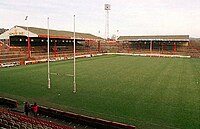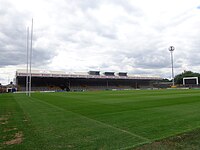
The Australian national rugby league team, the Kangaroos, have represented Australia in senior men's rugby league football competitions since the establishment of the game in Australia in 1908. Administered by the Australian Rugby League Commission, the Kangaroos are ranked first in the IRL Men's World Rankings. The team is the most successful in Rugby League World Cup history, having won the competition 12 times, and contested 15 of the 16 finals, only failing to reach the final in the 1954 inaugural tournament. Only five nations have beaten Australia in test matches, and Australia has an overall win percentage of 69%.
Robert Fulton, also nicknamed "Bozo", was an Australian international rugby league footballer, coach and later commentator. Fulton played, coached, selected for and has commentated on the game with great success at the highest levels and has been named amongst Australia's greatest rugby league players of the 20th century. As a player Fulton won three premierships with the Manly-Warringah Sea Eagles in the 1970s, the last as captain. He represented the Australian national side on thirty-five occasions, seven times as captain. He had a long coaching career at the first grade level, taking Manly to premiership victory in 1987 and 1996. He coached the Australian national team in thirty-nine Tests. He was a New South Wales State selector and a national selector. He was a radio commentator with 2GB at the time of his death in 2021, aged 73. In 1981, he was selected as one of the initial four post-war "Immortals" of the Australian game and, in 2008, he was named in Australia's team of the century.
Graham "Wombat" Eadie, is an Australian former rugby league footballer who played in the 1970s and 1980s. He has been named amongst Australia's finest of the 20th century. A New South Wales State of Origin and Australian international representative fullback, he played in Australia during Manly-Warringah's dominance of the NSWRFL competition during the 1970s. He won four premierships with them and his 1,917 points in first grade and 2,070 points in all grades were both records at the time of his retirement. Eadie also played in England for Halifax, winning the Challenge Cup Final of 1987 with them. He also won World Cups with Australia and collected awards such as the Rothmans Medal and Lance Todd Trophy.
Kenneth John Irvine, also nicknamed "Mongo", was an Australian professional rugby league footballer who played in the 1950s, 1960s and 1970s. He holds the standing Australian record for the most tries in a first-grade career – 212. No other player has yet managed 200 tries in their Australian club career, with the closest to Irvine's tally being South Sydney Rabbitohs player Alex Johnston who has scored 195 tries. He is also the 2nd all-time top try-scorer for the Australian national team with 33, two behind Darren Lockyer's 35. Irvine's great speed is legendary and he is regarded as Australia's greatest ever winger, being named in 2008 in the list of Australian rugby league's 100 greatest players, as well as being an automatic selection for the Australian Rugby League's "Team of the Century".
Stephen John Ella is an Australian former rugby league footballer who played in the 1970s and 1980s. He was a utility back for the Parramatta Eels, New South Wales and Australia, playing in 4 Tests for Australia between 1983 and 1985. He is a cousin of the Ella brothers who were prominent in Australian rugby union in the 1980s.
Michael David O'Connor is an Australian former rugby league and rugby union footballer who represented Australia in both codes. He played for the Wallabies in 13 Tests from 1979 to 1982 and then the Kangaroos in 17 Tests from 1985 to 1990. O'Connor played club football in the NSWRL Premiership for the St. George Dragons from 1983 until 1986, and later the Manly-Warringah Sea Eagles from 1987 until his retirement at the end of 1992, becoming captain of Manly in 1990, as well as winning the 1987 Winfield Cup with the Sea Eagles.
The 1994 Kangaroo Tour was the 18th and last Kangaroo Tour played in the conventional format, where the Australia national rugby league team played a number of matches against British and French clubs or provincial outfits, in additions to the Test matches. The outbreak of the Super League war in early 1995 meant that the next Kangaroo tour, set for 1998, never eventuated; although shortened, test only tours were staged in 2001 and 2003.

Noel Harvey "Crusher" Cleal is an Australian former professional rugby league footballer and coach. A destructive second-row for the Manly Sea Eagles, he also represented New South Wales in the State of Origin Series and the Australian national rugby league team.
Michael William Cronin OAM is an Australian former professional rugby league footballer and coach. He was a goal-kicking centre for the Australian national team and a stalwart for the Parramatta Eels club. He played in 22 Tests and 11 World Cup matches between 1973 and 1982. Cronin retired as the NSWRL Premiership's and the Australian Kangaroos' all-time highest point-scorer and has since been named amongst the nation's finest footballers of the 20th century.

Cliff Lyons is an indigenous Australian former international rugby league footballer who played in the 1980s and 1990s. A Clive Churchill Medallist and two-time Dally M Medallist, he made 309 first-grade appearances with the Manly Warringah Sea Eagles, winning grand finals with them in 1987 and 1996. Lyons also represented New South Wales and Australia, being part of the successful 1990 Kangaroo Tour of Great Britain and France.
Les Boyd is an Australian former rugby league footballer who played in the 1970s and 1980s. He played representative football for the Australian national side in international matches as well as the New South Wales side in the State of Origin. Boyd played club football in both Australia and England and his usual position was in the second-row.
The 1990 Kangaroo Tour was the seventeenth Kangaroo Tour, where the Australian national rugby league team travelled to Europe and played eighteen matches against British and French club and representative rugby league teams, in addition to three Test matches against Great Britain and two Tests against the French. It followed the tour of 1986 and the next was staged in 1994.
The 1986 Kangaroo tour of Great Britain and France was the sixteenth Kangaroo tour in which the Australian national rugby league team plays a number of tour matches against British and French teams, in addition to the Test matches. The next Kangaroo tour was staged in 1990.
The 1982 Kangaroo tour was the fifteenth Kangaroo tour where the Australian national rugby league team played a number of matches against British and French rugby league teams, in addition to the Test matches. The Australia national rugby league team have generally since 1908 barring wartime, toured Great Britain every four years often capping the tour with matches and Tests in France. This regular touring side are known as the Kangaroos.
The 2003 Kangaroo Tour was a six-match tour by the Australia national rugby league team of France, Wales and England, and to date has been the last Kangaroo Tour. The last three matches were all Tests against Great Britain for the Ashes. Coached by Chris Anderson and captained by Darren Lockyer, Australia continued its dominance, winning all of the three tests against Great Britain and retaining The Ashes that they have held since 1973, although the 3-0 series win didn't show how close the series really was as Australia had to come from behind to win every test, and won each match by a margin of no more than one converted try making it arguably the closest Ashes series since 1974.
The 1992 Great Britain Lions tour was a tour by the Great Britain national rugby league team, nicknamed the 'Lions', of Papua New Guinea, Australia and New Zealand which took place between May and July 1992. The tour was the last of such length undertaken by the Great Britain team, and included a test match against Papua New Guinea, a three-test series against Australia for The Ashes, and a two-test series against New Zealand for the Baskerville Shield, all interspersed with matches against local club and representative teams.
The 1991 Trans-Tasman Test series was an international rugby league test series played in Australia between Australia and New Zealand. The series, which started on 3 July in Melbourne and finished on 31 July in Brisbane, consisted of three test matches, with the third test doubling as a 1989–1992 Rugby League World Cup tournament match. New Zealand did not play in any other matches while on tour.
The 1995 Trans-Tasman Test series was an international rugby league, three test series played in Australia between the Australian Kangaroos and New Zealand national rugby league team. As the series was played in the middle of the 1995 ARL season and most of the Kiwis selected came from Australian Rugby League (ARL) clubs, New Zealand did not play in any tour matches while in Australia, but prior to the series against Australia they had a two test home series against France.
The 1988 Great Britain Lions tour was the Great Britain national rugby league team's 18th tour of Australasia and took place from May to July 1988. It started with a Test match against Papua New Guinea before the best-of-three series against Australia for the Ashes title, and finally a Test against New Zealand. Some of these matches counted toward the ongoing 1985–1988 World Cup tournament. An additional 13 matches were played against local club and representative sides from each host nation.
The 1973 Kangaroo Tour was the thirteenth Kangaroo Tour, and saw the Australian national rugby league team travel to Europe and play nineteen matches against British and French club and representative rugby league teams, in addition to three Test matches against Great Britain and two Tests against the French. It followed the tour of 1967-68 and the next was staged in 1978.






